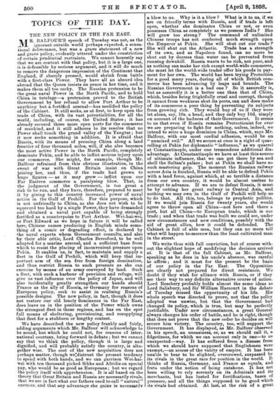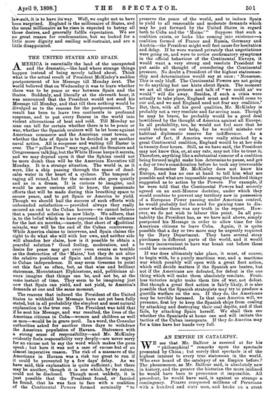TOPICS OF THE DAY.
THE NEW POLICY IN THE FAR EAST.
MR. BA LFOUR'S speech of Tuesday was not, as the ignorant outside world perhaps expected, a sensa- tional deliverance, but was a grave statement of a new and grave policy, evidently uttered under the constriction of certain prudential restraints. 'We cannot honestly say that we are content with that policy, but it is a large one, it is defensible by serious argument, and it will do much to remove the dangerous impression of the Continent that England, if sharply pressed, would shrink from battle with a first-class Power. They have all an absurd idea abroad that the Queen insists on peace in her time, and it makes them all too cocky. The Russian pretension to be the great naval Power in the North Pacific, and to hold China in tutelage—a pretension proved to the British Government by her refusal to allow Port Arthur to be anything but a fortified arsenal—has modified the policy of the Cabinet. It still seeks, as at first, to keep open the trade of China, with its vast potentialities, for all the world, including, of course, the United States ; it has already secured three more open ports for the commerce of mankind, and it still adheres to its resolve that no Power shall touch the grand valley of the Yangtse ; but it now seeks something in addition. It is afraid that Russia, with its means of pressing China along a land frontier of four thousand miles, will, if she also becomes the most active Power in the North Pacific, completely dominate Pekin, and be able to inflict serious injury upon our commerce. She might, for example, though Mr. Balfour refrained from this obvious illustration, in the event of war with Great Britain insist on China joining her, and thus, if the trade had grown to huge figures — as it may grow — inflict upon our Far Eastern commerce a paralysing blow. That, in the judgment of the Government, is too great a risk to be run, and they have, therefore, prepared to meet it by giving to this country increased power of naval action in the Gulf of Pechili. For this purpose, which is not unfriendly to China, as she does not wish to be squeezed too hard by a single Power, they have demanded and obtained a naval port capable of being strongly fortified as a counterpoise to Port Arthur. Wei-hai-wei, or Port Edward as we hope in future it will be called here, Chinese names producing in English minds some- thing of a comic or degrading effect, is declared by the naval experts -whom Government consults, and also by their able critic, Lord Charles Beresford, to be well adapted for a marine arsenal, and a sufficient base from which to resist the placing of inconvenient pressure upon Pekin. It enables us, in fact, to maintain and supply a fleet in the Gulf of Pechi]i, which will keep that im- portant arm of the sea free from foreign domination, and thus restrict Russia to such pressure as she can exercise by means of an army conveyed by land. Such a fleet, with such a harbour of provision and refuge, will give us vast influence over the policy of Japan, and will also hicidentally greatly strengthen our hands should France as the ally of Russia, or Germany for reasons of European policy, seek to assist in realising Russia's possible designs. The new policy, in fact, though it does not restore our old lonely dominance in the Far East, does leave us in the position of the Power which owns the strongest fleet in those regions, and has on the spot full means of sheltering, provisioning, and resupplying that fleet for a stubborn or lengthy contest.
We have described the new policy frankly and fairly, adding arguments which Mr. Balfour will acknowledge to be sound, but which he could not, for reasons of inter- national courtesy, bring forward in debate ; but we cannot say that we think the policy, though it is large and dignified, and will probably satisfy the country, is alto- gether wise. The cost of the new acquisition does not perhaps matter, though we:distrust the present tendency to spend with both hands, and we can garrison Wei-hai- wei with ten thousand picked Sikhs and Afridis on special pay, who would be as good as Europeans ; but we regard the policy itself with apprehension. It is all based on the theory that Great Britain and Russia are necessarily rivals, that we are in fact what our fathers used to call "natural" enemies, and that any advantage she gains is necessarily a blow to us. Why is it a blow ? What is it to us, if we are on friendly terms with Russia, and if trade is left open, whether she dominates China or not, or even possesses China as completely as we possess India ? She will grow too strong ? The command of unlimited Chinese troops has not conferred much strength upon the Emperor at Pekin. She will shut out our trade ? She will shut out the Atlantic. Trade has a strength of its own, and as Napoleon found, can no more be shut out by decrees than water can be prevented from running downhill. Russia wants to be rich, not poor, and as nothing can make her rich except world-wide commerce, she must let the world-wide trader offer his goods in pay- ment for her own. The world has been trying Protection for a good many years, during all of which British com- merce has been advancing by leaps and bounds. The Russian Government is a bad one ? So it assuredly is„ but as assuredly it is a better one than that of China, which, besides being frightfully cruel and corrupt, though it cannot from weakness shut its ports, can and does make of its commerce a poor thing by preventing its subject& from growing rich. They would buy of us if they were let alone, say, 10s. a head, and they only buy 10d. simply on account of the badness of their Government. It seems to us that even if Russia remains Protectionist for ever we are preparing to fight for nothing, unless, indeed, we intend to seize a huge dominion in China, which, says Mr. Balfour, with our most cordial adhesion, would be an "unmixed evil." All we secure at once is a right of quar- relling at Pekin for diplomatic "influence," as we quarrel' at Constantinople, under one tremendous additional dis- advantage. At Constantinople we have at least this source of ultimate influence, that we can get there by sea and shell the Sultan's palace ; but at Pekin we shall have no such mastering grip. The moment the Russian railway across Asia is finished, Russia will be able to defend Pekin with a land force, against which, at so terrible a distance from our own country, it would be almost useless to attempt to advance. If we are to defeat Russia, it must be by cutting her great railway in Central Asia, and nothing we may own in the Gulf of Pechili will help us to do that. All this, too, belongs to prophetic politics. If we would join Russia for twenty years, she would agree to throw open all China—not here and there a port, but all China—to European trade, which is our trade ; and when that trade was built we could see, under new circumstances and new conditions, possibly with the aid of great allies, how it could be defended. The Cabinet is full of able men, but they can no more tell what will happen to-morrow than the least cultivated man in the street.
We write thus with full conviction, but of course with- out the slightest hope of modifying the decision arrived' at: It is that of the full Cabinet, as Mr. Balfour, speaking as he does in his uncle's absence, was careful to affirm ; and it must for the present be the basis of our policy in the Far East. The Opposition are clearly not prepared for direct resistance. We doubt if they wish for alliance with Russia, or if they see their way to any definite alternative course of action. Lord Rosebery probably holds almost the same ideas as Lord Salisbury, and Sir William Harcourt in the debate of Tuesday missed the opportunity of his life. His whole speech was directed to prove, not that the policy adopted was unwise, but that the Government had changed its policy, which is true, but may be perfectly justifiable. Under new circumstances, a great General always changes his order of battle, and he is right, though that does not prove that the new order he decides on will secure him victory. The country, too, will support the Government. It has displayed, as Mr. Balfour observed in his speech, an uneasiness, or, as we should call it, a fidgetiness, for which we can account only in one—to us unexpected—way. It has suffered from a disease from which we should have supposed that Englishmen were exempt,—an access of the vanity of empire. It has been unable to bear to be slighted, overcrowed, surpassed by its rivals in the great race for position in the world. It thinks of Russia, Germany, and France as equals, and frets under the notion of being outshone. It has not been willing to rely serenely on its Admirals and its merchants, but has lusted for fortifications, bases of pressure, and all the things supposed to be good which its rivals had obtained. At last, at the risk of a great law-tiuit, it is to have itiway. Well, we ought not to have been surprised. England is the millionaire of States, and the usual millionaire as he rises is expected to betray all those desires, and generally fulfils expectation. We see no great reason for condemnation, but we looked for a little more dignity and smiling self-restraint, and are a tittle disappointed.



































 Previous page
Previous page